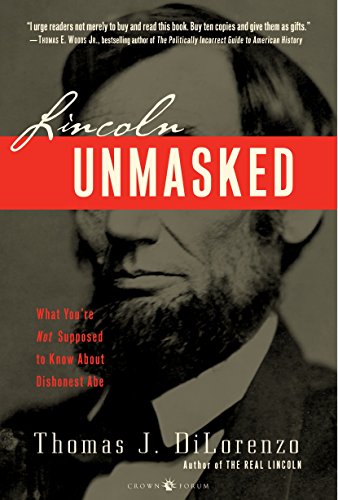For 150 years the American Lincoln cult denied what it called a “rumor” that, after a string of devastating battlefield defeats, Abraham Lincoln in 1862 offered command of the U.S. Army to an Italian mercenary named Giuseppe Garibaldi. The “rumor” was proven to be true, however, when an Italian historian named Arrigo Petacco discovered in an Italian archive a faded letter from Garibaldi to King Victor Emmanuel II of Italy, telling the king of the offer (See Rory Carroll, “Garibaldi Asked by Lincoln to Run Army”).
Garibaldi was Lincoln’s first choice to replace General George McClellan, long before Ulysses S. Grant took command of the Army of the Potomac. It is obvious why Lincoln made the offer. In the early nineteenth century Italy was a confederation of states, with Sicily being the most prosperous. At the time, Sicily was not composed of just a few islands, but also a large portion of the Italian peninsula. It included
 The Real Lincoln: A Ne...
Best Price: $4.25
Buy New $7.48
(as of 07:05 UTC - Details)
Calabria, Lucania, Basilicata, Campania, Puglia, Abruzzi, and Molise (See S. Ben Piazza, “Garibaldi, Italian Unification and Sicily”). This “southern kingdom” was the richest of all the Italian states.
The Real Lincoln: A Ne...
Best Price: $4.25
Buy New $7.48
(as of 07:05 UTC - Details)
Calabria, Lucania, Basilicata, Campania, Puglia, Abruzzi, and Molise (See S. Ben Piazza, “Garibaldi, Italian Unification and Sicily”). This “southern kingdom” was the richest of all the Italian states.
A relatively unknown Italian politician named Victor Emanuel II, who was king of Sardinia and Piemonte (an “inconsequential military and economic state” according to one Italian historian), aspired to be king of all of Italy. Like Lincoln, he considered federalism and states’ rights to be the essence of anarchy and wanted to preside over one consolidated glorious Italian union. Garibaldi would become his henchman who forced, at gun and bayonet point, Sicily and the rest of Italy to come under the single, consolidated rule of King Emanuel II. According to the historian S. Ben Piazza, cited above, Garibaldi already had the reputation as “an international adventurer and freebooter, better known for his paramilitary forays and terrorism carried out against civilian populations in South America, particularly Brazil and Uruguay.” He was an international mercenary terrorist and, as such, was just the man Lincoln was looking for to be in charge of the entire U.S. Army as it invaded a part of its own country.
Upon conquering Sicily, Garibaldi met with King Victor Emanual II, who promptly seized the vast gold treasury of Sicily. It was one of the biggest looting and plundering sprees in European history. Much of the loot was “shared” in the form of corporate welfare for the Northern Italian, politically-connected business class. This of course was also a hallmark of the Lincoln administration’s Hamiltonian economic policy of “internal improvements,” a euphemism for corporate welfare for railroad, mining, forestry, and other corporations that supported the Republican Party.
 Lincoln Unmasked: What...
Best Price: $5.95
Buy New $9.85
(as of 07:10 UTC - Details)
Lincoln Unmasked: What...
Best Price: $5.95
Buy New $9.85
(as of 07:10 UTC - Details)
Southern Italy was plundered and impoverished by Garibaldi’s exploits, just as the American South was plundered and destroyed economically by war and “reconstruction” at the hands of Lincoln, Grant, Sherman, Sheridan, and the rest. As with the American “Civil War heroes,” Garibaldi never accepted responsibility for his actions. Why would he?! Piazza quotes him as saying, years later, that “the outrages and injustices perpetrated against the southern [Italian] people are immense and immeasurable. I do not feel that I was personally responsible, for I have a clear conscience on the matter.” Garabaldi also admitted that he would never do it again, for fear “I would be stoned to death, having engendered nothing but squalor and hate in the process.” It is no mere accident, notes Piazza, that the great migration of Italians to “the new world” in the late nineteenth/early twentieth century came overwhelmingly from the impoverished South.
Garibaldi turned down Lincoln’s offer, which is understandable. If he accepted the offer he would not be terrorizing mostly unarmed Italian peasants, but engaging in a battle to the death with Robert E. Lee’s Army of Northern Virginia which, for the previous two years, had mostly destroyed and devastated Lincoln’s invading armies.






